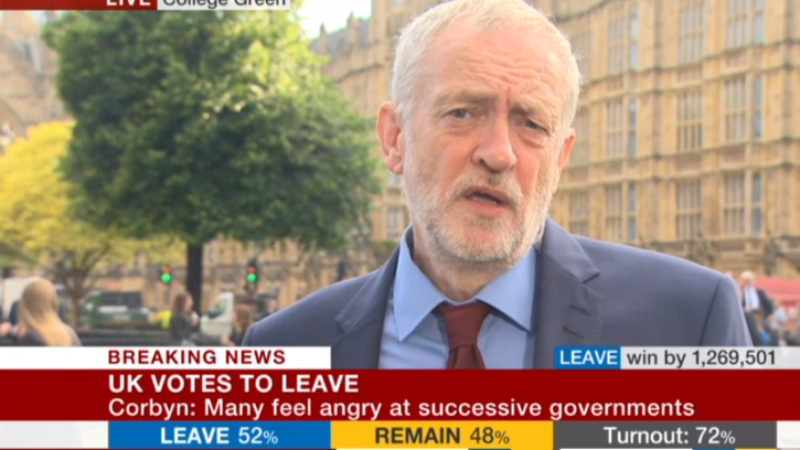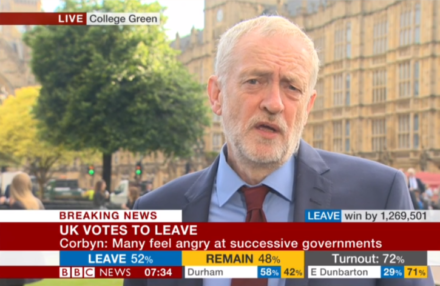

The first wave of Brexit talks has been and gone. The first day “was so intense officials did not take a coffee break and were running out of water,” The Guardian reported from Brussels. This is only the beginning of tough negotiations over a final Brexit bill that could run into tens of billions of pounds. Nevertheless, “Go whistle” for the money, as Boris Johnson so elegantly put it to the UK’s 27 neighbouring nations, does not bode well.
With all the problems our intertwined societies face across a crowded Europe, millions of Britons would rather do without Brexit and go for more co-operation among EU states. The 48 per cent have shown Theresa May they’re still alive and kicking. So, can Brexit be averted?
The June general election indicated that the Tories and UKIP don’t have the same level of support as they had in the previous two years. Support for non-progressive outfits is patently dwindling. Labour should take advantage of this and lay its cards on the table. Something, it seems, it has no intention of doing, at least in a way coherent with its past and international commitments.
Labour, in fact, is way too ambiguous on Brexit. It’s a tactic that may have helped in the run-up to the general election. The young went out to support Jeremy Corbyn en masse. Aside from Bernie Sanders and Pablo Iglesias, no other leader has managed in recent years to connect so well with the under-35s. But did the progressive youth of Britain go to the ballot box with Europe in mind? Weren’t they thinking more of university fees, the cuts in unemployment and disability benefits, the bedroom tax, the dementia tax, the general whiff of downright nastiness leaking out of No 10 over the past seven years? In the light of this, is confronting head-on a merely consultative referendum that much of a democratic issue?
Europe was always there as well, however, as an open question; if not a priority, it was surely at the back of everybody’s minds. Brexit, if implemented, could be an epochal change like few others. So, hasn’t the public had the time to reflect more over the past year about the risks of Brexit? Especially in the face of the evident unpreparedness shown by the core negotiatiors, the Department for Exiting the EU (DexEU) and the Treasury? Didn’t a share of the increased vote for left and centre-left come from this as well as the powerful push from millennials rightly worrying about money and their job prospects?
Another question follows spontaneously: why not challenge Brexit more openly now, instead of pfaffing around with a soft version? The answer here could be summed up in a word: immigration. Soft Brexit could allow access to the single market without freedom of movement. The perfect – and only theoretical – way of keeping a hypothetical majority happy. This is Labour’s current plan. Tony Blair has reinforced it recently by claiming Germany and France share Britain’s concerns about immigration, implying in an article for The Independent that Germany and France are also against EU immigration.
Yet, this is simply not viable. Freedom of movement is the EU’s most sacred principle and is currently upheld by all EU members. The issue on the continent is immigration from outside the EU, not from within. Austria now wants to partly close off the Brenner Pass, but not to impede Italian economic movement. The heated debate between Vienna and Rome is about other people, many of whom, incidentally, are coming from devastated Commonwealth countries.
Moreover, if a considerable share of the British public feels it has a problem with EU citizens – which is still to be proved – then the UK can’t be part of the EU in any way possible. In this sense, Theresa May was right: Brexit is Brexit. A clear-cut stance, at least. One that, however, is bringing her down: recent successive portraits of her as a zombie and a stuttering robot are perfect snapshots. Hard Brexit is already hitting hard, with the prime minister as its first victim.
On the other hand, soft Brexit sounds like a shortcut, a clever way of patching up the awkward outcome of a national debate that was based on a few truths, many shame-faced lies and millions of dubious future-scenarios. Soft Brexit, it must be said, also appears to be damning of foreigners: surely this is a position an upright leftist party ought to review, and quickly.
The killing of freedom of movement is collateral damage with the potential to tarnish Labour’s reputation in friendly nations. Is it worth it? With soft Brexit, capital will move freely, but people not so. People are allowed to move to partly compensate them for the movement of capital, which can’t be stopped. To freely tap into the single market’s capital and simultaneously reject the people whose movement has crucially helped the single market’s cohesion is contradictory position for a party aspiring to be a flagship of global socialism.
Modern Labour’s two most charismatic if diametrically opposed figures – Tony Blair and Jeremy Corbyn – have always been keen to show they are very concerned about the life of ordinary people in the Middle East, so why not look a bit closer to home, too?
As it stands, Labour owes solidarity to British as well as EU citizens, wherever they are, and should act accordingly. Soft Brexit is not the right way of doing so. Labour has an international responsibility to uphold. Article 50 was triggered by a non-leader with the weakest of mandates ever. Make no mistake: Brexit can and should be averted.
Alessio Colonnelli has written for The Independent, the International Business Times and Open Democracy, amongst other publications and political blogs.




More from LabourList
Antonia Romeo appointed to lead civil service as new Cabinet Secretary
‘If Labour is serious about upskilling Britain, it must mobilise local businesses’
Stella Tsantekidou column: ‘What are we to make of the Labour Together scandal?’